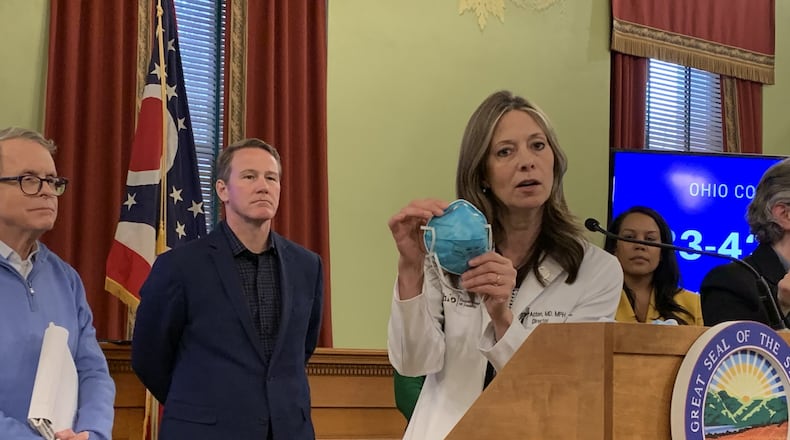>> MORE FROM SATURDAY'S PRESS CONFERENCE: Confirmed cases reported in 8 counties
Gov. Mike DeWine’s administration is now asking dentists, veterinarians and other health care providers to postpone elective surgeries in an effort to preserve the number of available masks and personal protective equipment that will be needed to respond to the coronavirus pandemic as the numbers continue to grow.
“We have a great shortage of these. You’re hearing about a national stockpile. We have some but the numbers are no where near what we will need. We are hearing from the front lines that there already is a shortage,” said Ohio Department of Health Director Amy Acton.
Dr. Acton said orders may be coming to redirect masks to the pandemic response.
Gov. DeWine said while Ohio received a shipment of some PPE from the national stockpile, there needs to be a post-pandemic national discussion about restoring America’s capability to manufacture critical items in a crisis.
“The idea that we’re scrambling now — and look, it’s going to work out — but the idea that all this stuff comes from China is outrageous and we should never let ourselves get into that position again,” DeWine said.
>> LATEST FROM WHITE HOUSE: Doctor says President Trump tests negative for coronavirus
In recent days, DeWine has taken steps to close schools, shut down mass gatherings and urge Ohioans to do “social distancing” in an aggressive attempt to tamp down on coronavirus infections so that Ohio’s health care system isn’t overwhelmed.
DeWine said he continues to look at other interventions, such as closing daycare centers. Again, DeWine urged parents who are able to pull their kids from childcare to do so right away.
School closings raise concerns
One of the biggest concerns with the K-12 shut down is delivering meals to students who rely on free breakfast and lunch at school. DeWine said Saturday that the federal waiver Ohio received to provide meals to K-12 students during the school shutdown will cover all children 18 or younger.
It’ll be up to each district to determine how to best make deliveries.
Dayton-area schools are working out ways to continue delivering education and food to students amid a forced three-week closure to stem the spread of coronavirus.
Most local schools have already shut down, though some including Huber Heights, Fairborn and Trotwood plan to close after classes on Monday, in accordance with the state’s order. The order closes schools until the week of April 6, though that could change and some districts are opening later.
Districts say they plan to continue distributing breakfast and lunch to students — many students in low-income families wouldn’t eat otherwise.
>> RELATED: Coronavirus prompts Kroger to reduce store hours
Dayton Public Schools needs volunteers to help deliver and pass out meals.
The district ideally needs about 10 volunteers per building to help pass out meals, and is asking the public for help. People interested in volunteering should contact DPSSupt@daytonpublic.com.
Each district is also grappling with coming up with ways to teach students remotely despite concerns about access to computers or internet.
Evictions, water, power shutoffs canceled
State and local leaders say they recognize the hardship imposed on Ohio families.
Dayton Municipal Court Clerk of Courts Mark Owens said municipal court judges issues an administrative order on March 12 to postpone eviction cases will not be heard until after April 30, 2020.
Mayor Nan Whaley said the city of Dayton will suspend water shutoff to April 30 and help with food delivery to those in need. City officials are also working on strategies to help businesses that are hurting financially due to ramifications from the virus.
Dayton Power & Light said Saturday that the company will immediately begin suspending disconnection for nonpayment.
Mental health
More than 18,000 calls have poured into the state hotline, 833-4-ASK-ODH, from Ohioans anxious to get answers on coronavirus.
“We all have to start looking that this is going to be here for a while because it is. We know that,” said DeWine. He urged Ohioans to help one another and to pay attention to their physical and mental health.
Ohio Department of Mental Health and Addiction Services Director Lori Criss delivered tips on reducing stress and anxiety during the pandemic: get information from trusted sources; limit your media exposure so you’re not overwhelmed; and go to your usual methods of stress reduction, such as exercise or family time.
Criss urged people who are experiencing persistent thoughts that make them anxious to reach out to friends or professionals for help and anyone feeling hopeless or helpless to seek immediate professional help.
Ohio will file for emergency rules to expand the use of tele-health for mental health and substance abuse treatments and allow professionals and patients to connect through phone apps such as Facetime, Criss said.
More flexibility will be given to addiction treatment clinics for how they staff their facilities to reduce possible exposure to the virus, she added.
Jonas Thom, Vice President of Behavioral Health, CareSource, said it is important for people to continue their behavioral health treatment plan.
“If you are feeling stressed about the illness and about the response to it, do get the facts from trusted sources,” Thom said, pointing to the CDC, Ohio Department of Health and people’s health care provider as good sources.
And while there are a lot of other disruptions, behavioral health care remains available, Thom said.
“Providers in the behavioral health system are trying to expand their telephonic and telehealth resources to help support people throughout this time,” Thom said.


